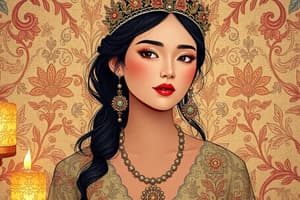Podcast
Questions and Answers
What does the concept of 'pakikisama' emphasize in Filipino culture?
What does the concept of 'pakikisama' emphasize in Filipino culture?
- The pursuit of self-actualization
- The necessity of achieving personal goals
- The importance of individual autonomy
- The significance of harmonious relationships (correct)
How is 'personhood' defined in the context of Filipino culture?
How is 'personhood' defined in the context of Filipino culture?
- As an individual's social identity recognized by society (correct)
- As a set of personal attributes
- As an autonomous individual seeking personal fulfillment
- As the pursuit of self-actualization
Which value in Filipino culture directly relates to a sense of obligation towards others?
Which value in Filipino culture directly relates to a sense of obligation towards others?
- Hiya
- Independencia
- Utang na loob (correct)
- Autonomía
What primarily differentiates the notion of self in Western cultures from that in Filipino culture?
What primarily differentiates the notion of self in Western cultures from that in Filipino culture?
In what way is the self viewed according to contemporary anthropology?
In what way is the self viewed according to contemporary anthropology?
Why might the concept of self-actualization feel alien to Filipinos?
Why might the concept of self-actualization feel alien to Filipinos?
What role does the concept of 'hiya' play in Filipino identity?
What role does the concept of 'hiya' play in Filipino identity?
Which cultural framework is associated with encouraging individuals to seek personal fulfillment independent from social expectations?
Which cultural framework is associated with encouraging individuals to seek personal fulfillment independent from social expectations?
What concept did Franz Boas challenge regarding cultural development?
What concept did Franz Boas challenge regarding cultural development?
Which anthropologist is credited with the idea of culture as a 'web of meaning'?
Which anthropologist is credited with the idea of culture as a 'web of meaning'?
How does Filipino culture primarily define personal success?
How does Filipino culture primarily define personal success?
Which perspective emphasizes the self as shaped by social roles and relationships?
Which perspective emphasizes the self as shaped by social roles and relationships?
Which of the following anthropologists was known for her studies on adolescence and gender roles?
Which of the following anthropologists was known for her studies on adolescence and gender roles?
What do family-centered societies, like Filipino culture, prioritize in comparison to individual-centered societies?
What do family-centered societies, like Filipino culture, prioritize in comparison to individual-centered societies?
Which of the following best describes the societal expectation of children in Filipino culture?
Which of the following best describes the societal expectation of children in Filipino culture?
What was a significant contribution of Ruth Fulton Benedict to cultural anthropology?
What was a significant contribution of Ruth Fulton Benedict to cultural anthropology?
What describes the Filipino concept of 'bayanihan'?
What describes the Filipino concept of 'bayanihan'?
What fundamental aspect distinguishes Filipino identity from more individualistic societies?
What fundamental aspect distinguishes Filipino identity from more individualistic societies?
In what way do anthropological studies contribute to understanding Filipino identity?
In what way do anthropological studies contribute to understanding Filipino identity?
What is the primary characteristic of resilience as understood within Filipino culture?
What is the primary characteristic of resilience as understood within Filipino culture?
How does the Filipino perspective on self differ from Western views?
How does the Filipino perspective on self differ from Western views?
Which of the following is NOT a feature of Filipino communal identity?
Which of the following is NOT a feature of Filipino communal identity?
What insight does contemporary anthropology provide regarding identity in diverse cultures?
What insight does contemporary anthropology provide regarding identity in diverse cultures?
Which contrast is highlighted between Filipino and German problem-solving approaches?
Which contrast is highlighted between Filipino and German problem-solving approaches?
What does the term 'anthropology' originate from?
What does the term 'anthropology' originate from?
Which of the following best describes the contemporary anthropological view of 'the self'?
Which of the following best describes the contemporary anthropological view of 'the self'?
How is the self perceived within Filipino culture according to the report?
How is the self perceived within Filipino culture according to the report?
What is a key distinguishing feature of Filipino selfhood compared to Western notions?
What is a key distinguishing feature of Filipino selfhood compared to Western notions?
In anthropology, what does the term 'personhood' likely refer to?
In anthropology, what does the term 'personhood' likely refer to?
Which aspect is NOT emphasized in the contemporary understanding of the self according to the report?
Which aspect is NOT emphasized in the contemporary understanding of the self according to the report?
What role do collective experiences play in the formation of 'the self'?
What role do collective experiences play in the formation of 'the self'?
What significant contrast does the report discuss regarding the self and culture?
What significant contrast does the report discuss regarding the self and culture?
What is the significance of 'utang na loob' in Filipino culture?
What is the significance of 'utang na loob' in Filipino culture?
How does 'hiya' function within Filipino society?
How does 'hiya' function within Filipino society?
What distinguishes Filipino families from Western nuclear families?
What distinguishes Filipino families from Western nuclear families?
According to anthropology, how is 'the self' conceptualized in Filipino culture?
According to anthropology, how is 'the self' conceptualized in Filipino culture?
What role does language play in Filipino culture?
What role does language play in Filipino culture?
What is a defining feature of communal events like 'fiestas' in Filipino culture?
What is a defining feature of communal events like 'fiestas' in Filipino culture?
In what way does Clifford Geertz's concept of 'thick description' relate to Filipino cultural practices?
In what way does Clifford Geertz's concept of 'thick description' relate to Filipino cultural practices?
What is the relationship between material and non-material culture in the Filipino context?
What is the relationship between material and non-material culture in the Filipino context?
Flashcards
Anthropology
Anthropology
The study of humankind, focusing on their cultural, social, and biological dimensions.
The Self
The Self
A key concept in anthropology, referring to the understanding of who we are as individuals and how our identity is shaped by social and cultural forces.
Western Self
Western Self
The Western notion of self emphasizes individuality, personal freedom, and autonomy.
Anthropological Self
Anthropological Self
Signup and view all the flashcards
Filipino Self
Filipino Self
Signup and view all the flashcards
Comparative Analysis
Comparative Analysis
Signup and view all the flashcards
Dynamic & Multifaceted
Dynamic & Multifaceted
Signup and view all the flashcards
Personhood
Personhood
Signup and view all the flashcards
Relational Self
Relational Self
Signup and view all the flashcards
Individualism
Individualism
Signup and view all the flashcards
Pakikisama
Pakikisama
Signup and view all the flashcards
Utang na loob (Debt of Gratitude)
Utang na loob (Debt of Gratitude)
Signup and view all the flashcards
Hiya (Sense of Propriety/Shame)
Hiya (Sense of Propriety/Shame)
Signup and view all the flashcards
Self
Self
Signup and view all the flashcards
Collectivism
Collectivism
Signup and view all the flashcards
Utang na Loob
Utang na Loob
Signup and view all the flashcards
Hiya
Hiya
Signup and view all the flashcards
Filipino Family Structure
Filipino Family Structure
Signup and view all the flashcards
Self Embedded in Culture
Self Embedded in Culture
Signup and view all the flashcards
Culture
Culture
Signup and view all the flashcards
Thick Description
Thick Description
Signup and view all the flashcards
Language and Respect in Filipino Culture
Language and Respect in Filipino Culture
Signup and view all the flashcards
Material vs. Non-material Culture
Material vs. Non-material Culture
Signup and view all the flashcards
Individual-Centered
Individual-Centered
Signup and view all the flashcards
Society-Centered
Society-Centered
Signup and view all the flashcards
Family-Centered
Family-Centered
Signup and view all the flashcards
Individual-Centered Societies
Individual-Centered Societies
Signup and view all the flashcards
Family-Centered Societies
Family-Centered Societies
Signup and view all the flashcards
What is 'bayanihan' in Filipino culture?
What is 'bayanihan' in Filipino culture?
Signup and view all the flashcards
Describe the collectivist orientation in Filipino culture.
Describe the collectivist orientation in Filipino culture.
Signup and view all the flashcards
How does anthropology define the 'self'?
How does anthropology define the 'self'?
Signup and view all the flashcards
Explain the concept of 'pakikisama' in Filipino culture.
Explain the concept of 'pakikisama' in Filipino culture.
Signup and view all the flashcards
What is 'utang na loob' in Filipino culture?
What is 'utang na loob' in Filipino culture?
Signup and view all the flashcards
What is 'hiya' in Filipino culture?
What is 'hiya' in Filipino culture?
Signup and view all the flashcards
How is the 'self' dynamic?
How is the 'self' dynamic?
Signup and view all the flashcards
Compare collectivism to Western individualism.
Compare collectivism to Western individualism.
Signup and view all the flashcards
Study Notes
Introduction to Anthropology of the Self
- Anthropology examines humans holistically, encompassing cultural, social, and biological dimensions
- The concept of the "self" is crucial in anthropology, exploring how experiences, interactions, and history form personal identities
- This study focuses on two perspectives: the self and person in contemporary anthropology, and the self embedded in culture, specifically relating to Filipino culture
The Self and Person in Contemporary Anthropology
- Contemporary anthropology views the "self" as dynamic, multifaceted, and constructed through social, cultural, and personal influences
- It is not a fixed entity but shaped by interactions within societal structures, showing individual identity and collective belonging
- The concept of the self is relational, not isolated
- This contrasts with the Western notion of selfhood that emphasizes individuality, freedom, and autonomy
The Relational Self in Filipino Culture
- The "relational self" is a dominant factor in Filipino culture
- Personal relationships and communal responsibilities are prioritized over individual autonomy
- Pakikisama is central to this relational self, emphasizing harmonious relationships
- Identity in Filipino culture is relational, shaped by social bonds, cultural participation, and obligations to family/community
The Self Embedded in Culture
- An individual's identity is intertwined with their cultural environment
- It's not an internal experience but a product of cultural values, social roles, and collective beliefs.
- This concept is examined through tangible and intangible cultural aspects
Cultural Values in Filipino Culture
- Utang na loob (debt of gratitude): A profound sense of gratitude towards those who have helped
- Hiya (sense of propriety or shame): Encourages conformity to societal expectations, protecting family honor and community cohesion
Filipino Family Unit and Self-Identity
- Filipino family structure is often extended (grandparents, aunts, uncles, cousins)
- Family events (fiestas, baptisms, weddings) strengthen familial ties and reinforce a collective sense of identity
- Filipino identity is deeply rooted in collectivism and relationality, differing from individualistic Western cultures
Resilience and Adaptability in Filipino Culture
- Filipinos are known for resilience, often described as "bayanihan" (community cooperation)
- This is evident in community support during times of crisis
Studying That Suits You
Use AI to generate personalized quizzes and flashcards to suit your learning preferences.



